What is Permanent Tooth Decay and permanent tooth decay treatment? Permanent tooth decay brings a lot of inconvenience in our daily lives. It not only affects eating, oral hygiene, and speaking activities but also causes discomfort. So what are the causes of permanent tooth decay? How to remedy this condition? What is the best way to treat permanent tooth decay? All the questions about permanent tooth decay treatment will be answered specifically by BeDental in the following article, please refer to it.
Which teeth are permanent?
Permanent teeth are the teeth that can last a lifetime if you have good care and oral hygiene practices. Permanent teeth begin to replace the primary or baby teeth around the ages of 6 to 12. Among them, the maxillary teeth numbers 6, 7, and 8 are the teeth that only erupt once.
Each person’s mouth has a total of 28 permanent teeth, including 4 central incisors, 4 lateral incisors, 4 canines, and 16 molars. Around the age of 17-25, we may also grow additional teeth, usually 1 to 4 third molars, also known as wisdom teeth. Therefore, the maximum number of permanent teeth in each person is 32 and the minimum is 28.
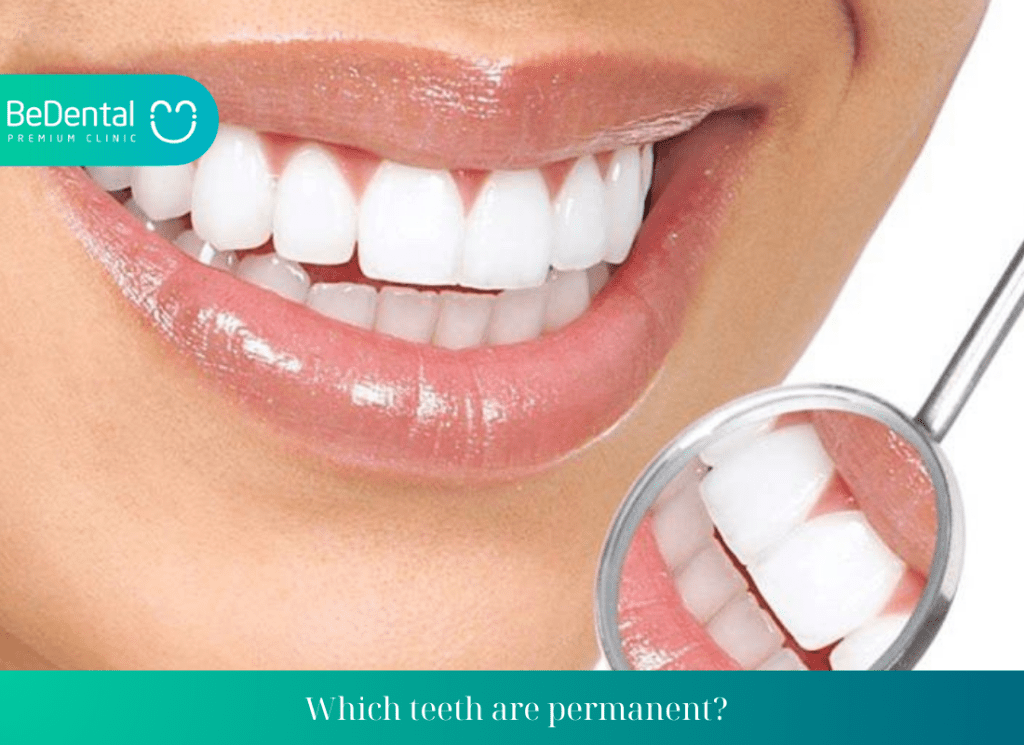
The process of permanent tooth decay formation
Tooth decay is a formidable enemy of oral health, as bacteria and harmful agents damage the hard tissues of the tooth. This is a common and concerning issue for children, as if not treated in a timely manner, tooth decay can have negative effects on the development and overall oral health. Understanding its stages helps highlight the importance of permanent tooth decay treatment
Tooth decay develops in distinct stages as follows:
- Enamel decay stage: At this stage, tooth decay is mild, causing opaque white spots on the tooth surface. This can make early detection difficult if oral care is not prioritized.
- Dentin decay stage: This is when bacteria grow and begin to attack the dentin, causing small black spots and increasing tooth sensitivity. Shallow dentin decay results in less severe damage to the dentin compared to deep dentin decay.
- Pulp decay stage: This is the most serious stage, where dentin decay has penetrated deep into the tooth, affecting the pulp chamber and causing damage to the tooth pulp. At this stage, the tooth becomes extremely sensitive and can cause severe pain and discomfort for the patient.
- Pulp necrosis: At this stage, the tooth pulp has suffered severe damage and cannot regenerate. Without nourishment from the pulp, the tooth loses sensation and no longer functions normally. In severe cases, tooth decay at this stage can lead to tooth mobility or even tooth loss, causing significant difficulties in eating and speaking. Therefore, to prevent serious consequences from tooth decay, permanent tooth decay treatment is crucial to prevent serious consequences daily oral care and regular dental check-ups are of utmost importance.
Without timely permanent tooth decay treatment, severe consequences such as tooth loss, gum disease, and pain can occur. Regular dental check-ups and good oral hygiene are essential.
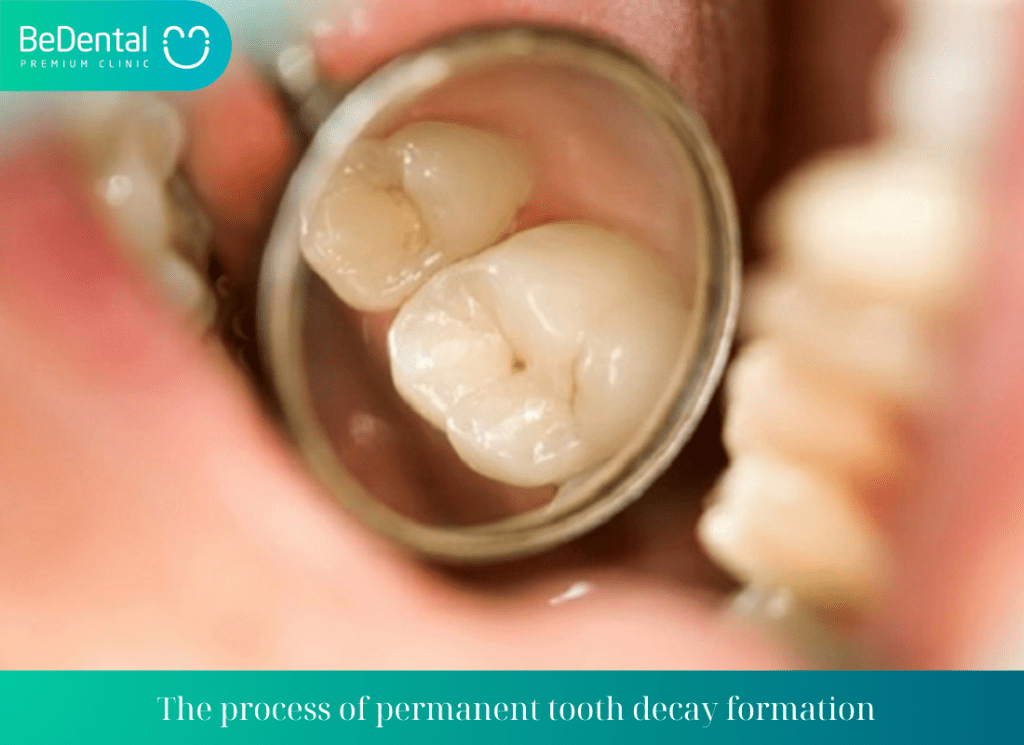
Causes of permanent tooth decay
Permanent tooth decay originates from various causes. The impact of bacteria and acidic decay agents breaks down the hard tissues of the tooth, gradually destroying the tooth structure. The most obvious manifestation is the appearance of small black holes on the tooth surface, followed by prolonged and uncomfortable toothaches. Experts explain that the causes of permanent tooth decay include:
Improper oral hygiene
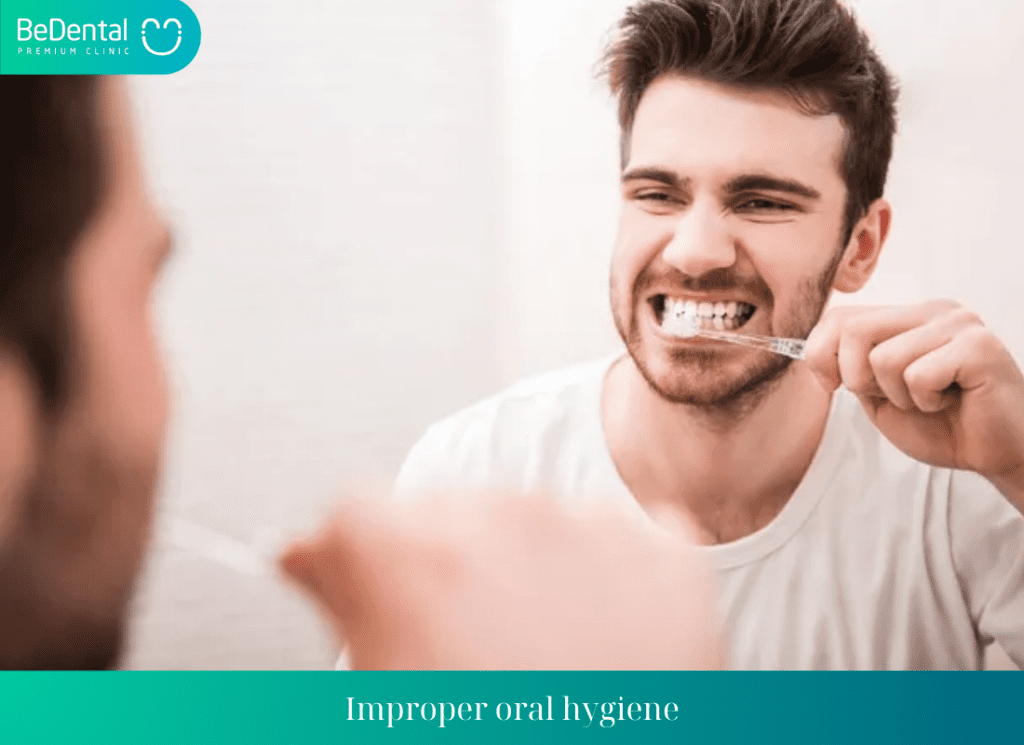
Many cases of permanent tooth decay due to decay always wonder why they brush their teeth regularly twice a day and still have tooth decay.
In fact, daily brushing is also a very effective way to prevent tooth decay. However, if brushing is done incorrectly, it not only fails to prevent the formation of tooth decay but also affects oral health due to excessive friction.
Tooth decay often forms in hard-to-clean areas of the mouth. If you only brush the surface of the teeth without reaching deep into the corners of the mouth and the gaps between the teeth, bacteria can still accumulate and grow. In addition, using a toothbrush that is too hard also weakens the teeth. As a result, tooth decay can easily penetrate and destroy the natural teeth which is why permanent tooth decay treatment is necessary to restore tooth health
See more: Tooth decay treatment
Unhealthy diet
In addition to oral hygiene issues, an unbalanced diet and improper food intake are also one of the causes of tooth decay in permanent teeth. Here is a list of food and drinks that have a negative impact on teeth:
- Foods high in sugar and starch increase the risk of tooth decay. On an existing decay surface, sugar and starch provide more favorable conditions for bacteria to grow, thereby accelerating the process of permanent tooth decay.
- Crumbly foods that easily get stuck between teeth also allow bacteria to cling, grow, and thrive.
- Soft and sticky foods also promote the development of tooth decay more than usual
- Carbonated drinks, alcoholic beverages, etc. can damage the teeth and make tooth decay easier to attack,making permanent tooth decay treatment crucial.
Permanent tooth decay treatment becomes crucial when these factors contribute to cavity formation
Weakened tooth enamel
It is known that tooth enamel plays an extremely important role in protecting the internal structure of the teeth. Under various external influences, the natural tooth enamel layer can be eroded and weakened. Once the tooth enamel is weakened, tooth decay can easily attack and destroy the entire tooth which is why permanent tooth decay treatment is needed to prevent further complications
In addition to the above reasons, permanent teeth can also decay due to tooth injury, dehydration, other diseases, etc. Regardless of the underlying cause, treating tooth decay, such as permanent tooth fillings, should be intervened early to preserve the teeth and prevent further decay.
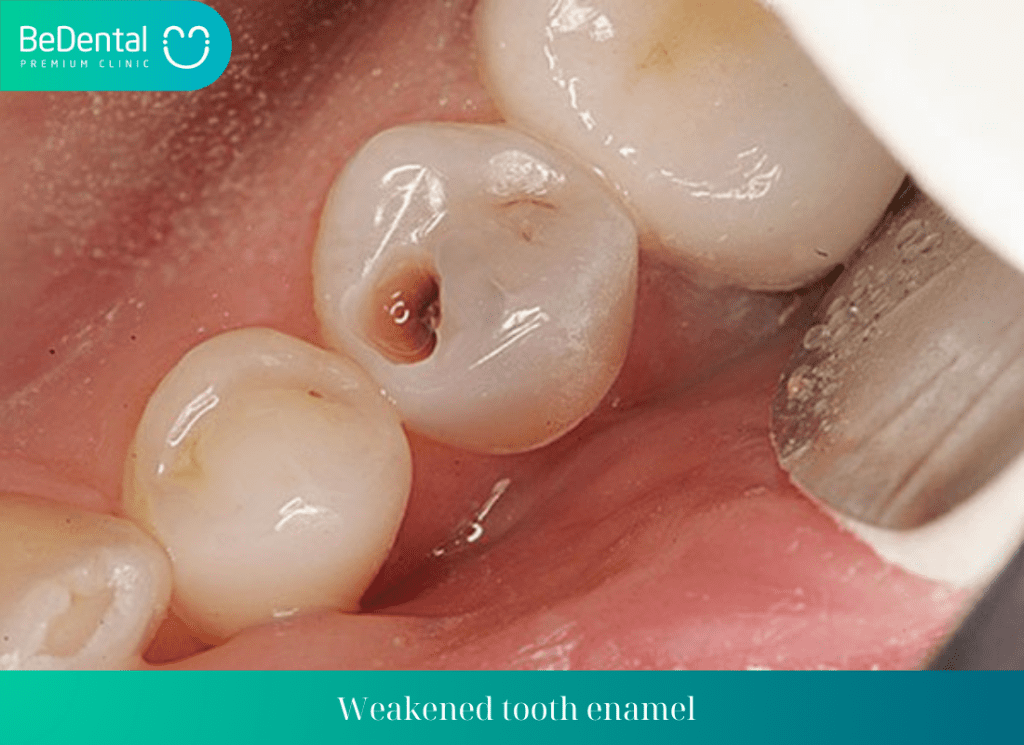
Are permanent teeth with cavities dangerous?
Are permanent teeth with cavities dangerous? We all know that permanent teeth do not have the ability to regrow if lost. When they are damaged, you need to find a way to restore their aesthetics and ensure their chewing function, such as getting permanent tooth fillings or getting permanent tooth decay treatment. In particular, if permanent teeth cavities are not treated in a timely manner, they can cause serious consequences in the future.
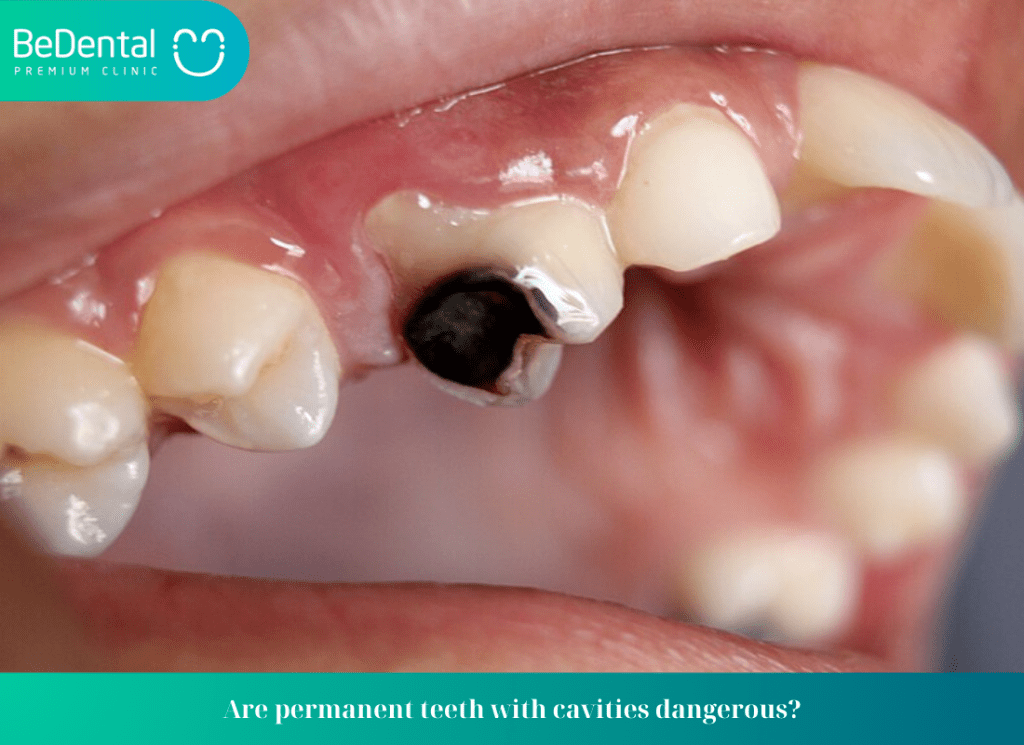
Therefore, treating cavities in permanent teeth is extremely important and urgent, and should be done early. If you are careless and do not intervene and remove the deep cavities, bacteria will eat into the softer layer of the tooth. Over time, when it reaches the pulp, tooth decay will cause persistent and unbearable pain that cannot be relieved. It may even lead to the risk of permanent tooth loss that cannot be restored. Dental crowns and fillings also cannot preserve the teeth anymore.
Losing permanent teeth will lead to other unforeseen consequences. Firstly, the aesthetics will be severely affected, especially for the incisors and canines. In addition, losing permanent teeth can also cause misalignment of the entire jaw. There are cases where the opposing tooth protrudes, causing imbalance in the teeth and bite disorders. Furthermore, severe cavities and tooth loss can also lead to decreased chewing function. Over time, it can lead to bone resorption, gum recession, and more.
To avoid aesthetic and functional issues, early intervention with permanent tooth decay treatment is recommended.
5 effective ways of permanent tooth decay treatment at home
- Using garlic and ginger to treat cavities in permanent teeth at home
Garlic and ginger are familiar spices in every Vietnamese household. They both have anti-inflammatory and high antibacterial properties. Therefore, they are an effective way to treat cavities in permanent teeth at home. The active compounds in garlic and ginger have the ability to reduce pain and inhibit the growth of cavity-causing bacteria. Specifically, Allicin, an active compound, has strong antibacterial properties and can relieve the toothache that is “rampaging” in the oral cavity.
To treat cavities in permanent teeth, crush equal amounts of ginger and garlic, and add a little salt to the mixture. After crushing, add a little water to dilute the mixture, which also helps prevent gum irritation. Then, simply dip a cotton ball into the diluted mixture and apply it directly to the affected tooth. Patients need to persistently perform this home treatment method 2-3 times a day to see results.
- Clove helps effectively treat cavities in permanent teeth
Clove is a special spice extracted from the Maluku Islands, Indonesia. It contains many active compounds, including Eugenol, which has natural numbing and anti-inflammatory and antibacterial effects. Therefore, clove becomes an effective solution to prevent bacterial infection in teeth and gums.
With its ability to effectively treat cavities in permanent teeth, clove is considered an excellent home remedy. You can soak a cotton ball in clove essential oil and place it on the affected area to effectively reduce pain. Chewing dried cloves is also encouraged, as it helps release and deposit Eugenol oil in the painful tooth area, effectively reducing toothache. Grinding cloves also helps develop and use the essential oil more easily.
- Treating cavities in permanent teeth with mint leaves
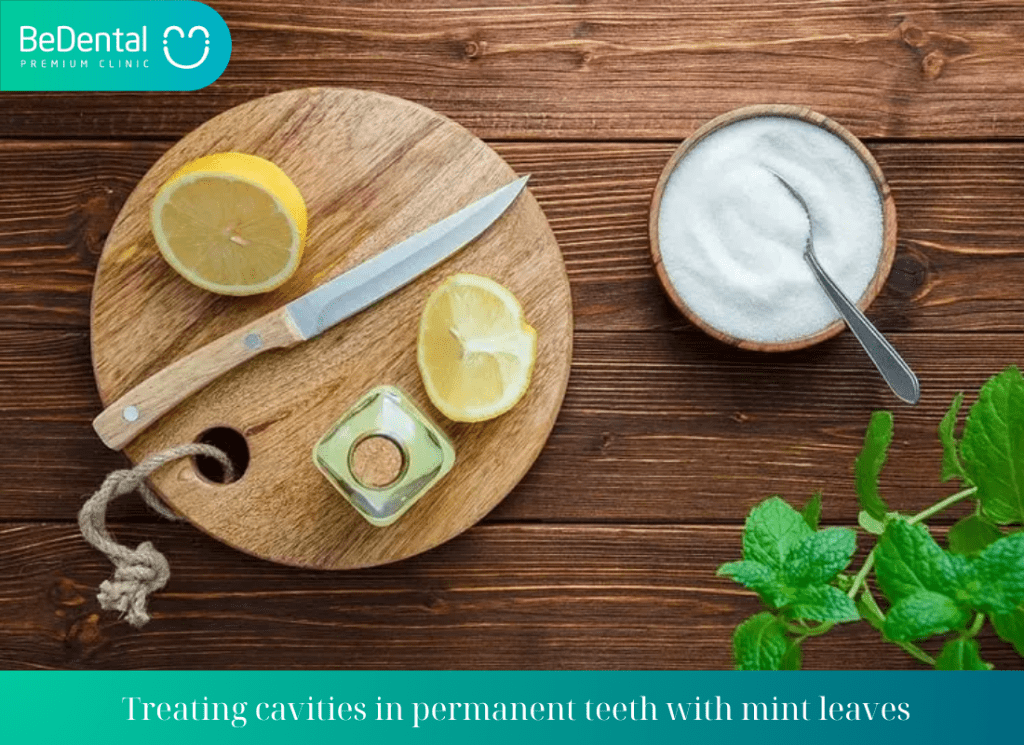
Not only cloves, mint leaves are also an effective solution for those experiencing toothaches. With its numbing and pain-relieving properties, peppermint essential oil also has a strong antibacterial effect. To extract the essential oil from mint leaves, you can soak dried leaves in boiling water for about 20 minutes to release the oil. After the water cools down, use this solution to rinse your mouth to reduce the pain.
In addition, to help relieve pain, you can use a warm peppermint tea bag and apply it to the painful tooth area for about 10-15 minutes. If there is no peppermint tea, you can also use pre-made peppermint essential oil, soak it in sterilized cotton and apply it to the painful tooth area. This is also one of the temporary ways to relieve toothache from cavities.
- Using cold ice to apply to the painful area caused by cavities

The method of limiting blood flow by using cold ice is a simple and effective way to treat cavities at home. The mechanism of this method is to reduce pain and inflammation due to the low temperature from the ice, while preventing pain signals from reaching the brain.
However, these methods do not guarantee absolute effectiveness. If the symptoms do not improve after 5-7 days, professional permanent tooth decay treatment is necessary for a long-term solution.
See more: Treatment methods for swollen gums caused by cavities
5 harmful effects of untreated cavities in permanent teeth
Currently, there are many methods to treat cavities. Most of them are simple techniques that do not cause pain, so many people tend to delay treatment. However, not treating cavities in permanent teeth in a timely manner can lead to unforeseen consequences and complications, such as:
- Impaired chewing function:
Untreated cavities in permanent teeth can significantly affect the chewing function of the entire jaw. Cavities often cause noticeable toothaches and discomfort while chewing food. Additionally, cavities can trap food particles, leading to unpleasant odors in the mouth.
- Increased risk of oral infections:
When cavities are left untreated, they can continue to expand. This allows food to easily get trapped in the deep cavities, causing pain or bleeding. Prolonged exposure to this condition can lead to gum inflammation and infections between the teeth.
- Permanent tooth loss:
In cases where cavities in permanent teeth are severely damaged and cannot be preserved, tooth extraction becomes necessary. When a tooth is extensively decayed or infected, only the root or a chronic infection that cannot be resolved remains, dentists will recommend tooth extraction.
- Loss of aesthetics:
Permanent teeth with cavities often lose their original white color and may turn dark. Moreover, long-standing cavities can lead to tooth fractures and create gaps on the tooth surface. Therefore, severe cavities can significantly affect the overall aesthetic appearance of the jaw, leading to a loss of confidence when communicating with others.
- Rapid spread of cavities to neighboring teeth:
Cavities not only destroy a single tooth. Once they reach a certain threshold, they tend to spread to neighboring areas. Cavities between teeth, for example, can trap food particles and quickly spread to adjacent teeth.
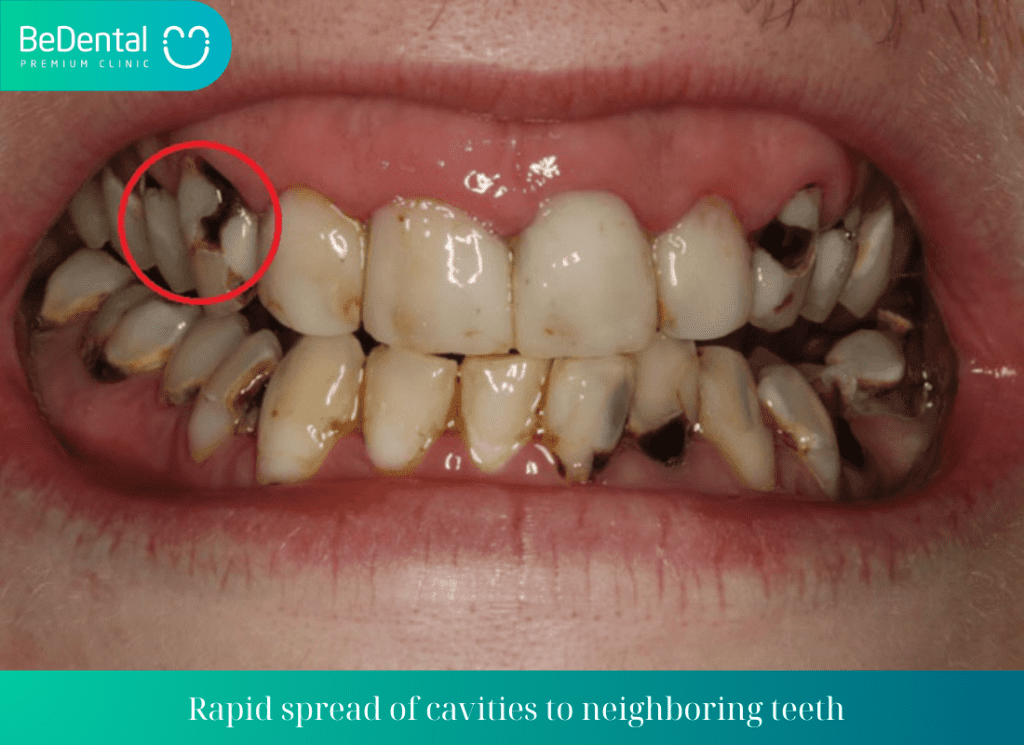
Best Permanent Tooth Decay Treatment Options ?
Cavities in permanent teeth can have numerous implications for oral health. Therefore, it is advisable to seek a dentist for thorough treatment.
Currently, there are two effective and safe methods for treating cavities in permanent teeth: permanent filling and dental crowns. Each method has its own advantages and disadvantages. The dentist will determine the most suitable method based on the severity of the cavities.
- Permanent filling for cavities
Permanent filling is considered the most effective, safe, quick, and cost-effective treatment option for cavities. By using specialized filling materials, it helps restore the aesthetic appearance of the tooth and fill the gaps caused by cavities.
Typically, mild to moderate cavities are treated with permanent filling. During the procedure, the dentist will clean out the decayed area and use appropriate filling materials such as silver, gold, or composite fillings.
See more: Signs of crooked tooth growing? How to have crooked tooth?
The advantages of permanent filling for cavities are that it prevents rapid spread of cavities, the technique is simple and non-invasive to the soft tissues of the tooth. The completed filling acts as a protective layer against bacterial attack. Additionally, the cost of permanent filling is relatively affordable, suitable for various customers.
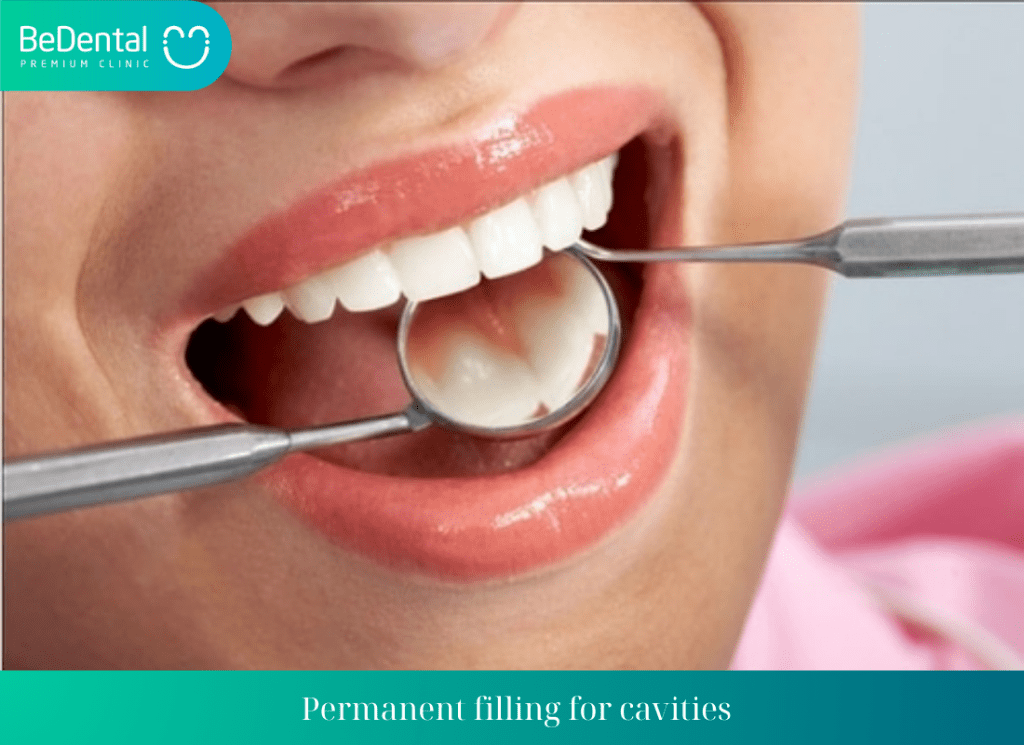
- Dental crowns
In the past, dental crowns were primarily known for their cosmetic benefits. Nowadays, dental crown techniques are also effective in treating and addressing permanent cavities.
For severe cavities that cannot be improved with fillings, dental crowns are the optimal choice. This is especially true for cases with severely damaged tooth structure, extensive cavities accompanied by yellow pus. During the procedure, the dentist will clean out the deep cavity, then carefully shape the tooth and place a high-quality dental crown on top.
In terms of advantages, dental crowns help preserve the tooth structure perfectly. They also prevent bacteria from invading and spreading cavities to neighboring areas. The lifespan of dental crowns is relatively long, up to 25 years with proper care. However, dental crowns can be costly and may affect the long-term structure and strength of the tooth. But for severe cavities to prevent tooth loss, dental crowns are still a good treatment option.
BeDental – Address for painless and reasonably priced permanent tooth decay treatment
For permanent cavities, it is advisable to visit a dentist for timely examination and treatment to avoid long-term impacts on the effectiveness of treatment or the occurrence of serious complications.
If you are worried about whether permanent filling for cavities is painful or long-lasting, you can visit BeDental to eliminate all concerns. The team of skilled and experienced dentists, along with the support of modern equipment, will make the filling process gentle and without any pain or discomfort. Moreover, with their expertise and high-quality filling materials, you won’t have to worry about the filling coming off or causing any allergies.
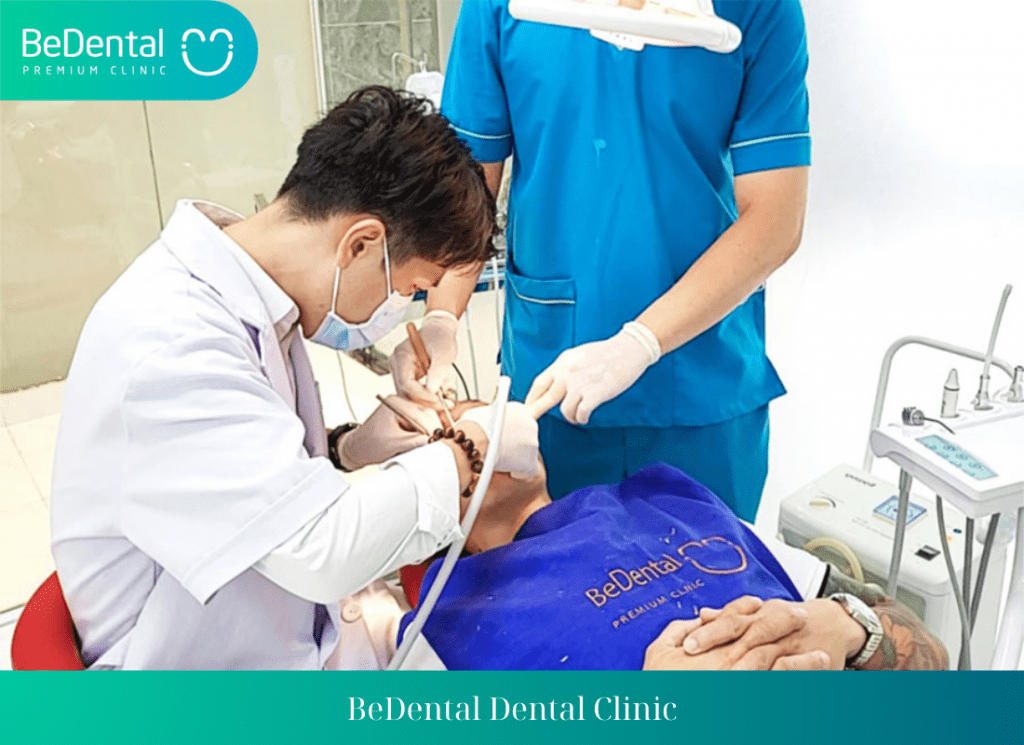
If you’re experiencing discomfort from tooth decay, schedule a consultation with our experienced dentists today. Don’t wait until it’s too late—get the best permanent tooth decay treatment now!
I hope the information in the article has helped you understand whether permanent filling for cavities is truly necessary or not. Do not underestimate or neglect the signs of tooth decay and visit a reputable dental clinic for early treatment. Contact BeDental now and receive discounted prices or free direct consultation with skilled dentists.
Price list reference:
| Danh mục | Unit | Giá thành | |
|---|---|---|---|
| 1.Teeth filling (More detail...) | |||
| Baby teeth filling | 1 Unit | 250.000 ~ 10$ |
|
| Permanent Teeth Filling | 1 Unit | 500.000 ~ 20$ |
|
Cosmetic Filling | 1 Unit | 700.000 ~ 28$ |
|
Sensitive teeth filling | 1 Unit | 500.000 ~ 20$ |
|
| Composite bonding | 1 Unit | 1.000.000 ~ 40$ |
|
| 2.Root Canal Treatment - Anterior by endodontist machine (More detail...) | |||
| Root Canal Treatment - Anterior for baby teeth | 1 Unit | 800.000 ~ 31$ |
|
| Root Canal Treatment - Anterior for Front teeth | 1 Unit | 1.200.000 ~ 47$ |
|
| Root Canal Treatment - Anterior for Premolar teeth | 1 Unit | 1.500.000 ~ 59$ |
|
| Root Canal Treatment - Anterior for molar teeth | 1 Unit | 2.000.000 ~ 79$ |
|
| 3.Root Canal reTreatment - Anterior by endodontist machine | |||
| Root Canal Treatment - Anterior for Front teeth by endodontist machine | 1 Unit | 1.500.000 ~ 59$ |
|
| Anterior for Premolar teeth by endodontist machine | 1 Unit | 1.800.000 ~ 71$ |
|
| Anterior for molar teeth by endodontist machine | 1 Unit | 2.300.000 ~ 90$ |
|
| 4 Vecniflour dental care (More detail...) | |||
| Vecniflour dental care for child | 1 Unit | 500.000 ~ 20$ |
PLEASE LEAVE YOUR INFORMATION IF YOU WANT FURTHER DENTAL CONSULTATION
Tư vấn chuyên môn bài viết:
BÁC SĨ DƯƠNG THỊ THÙY NGA
BEDENTAL - TOP STANDARD DENTISTRY SYSTEM
In HANOI
Address 1: 7B Thi Sach St, Ngo Thi Nham, Hai Ba Trung Dist, Ha Noi. - 0934.61.9090
Address 2: No 129 Hoang Ngan, Yen Hoa, Cau Giay Dist, Ha Noi. - 0934.61.9090
In HO CHI MINH
Address 1: 53 -55 -57 Pho Duc Chinh St, Nguyen Thai Binh, Dist. 1, Ho Chi Minh. - 0766.00.8080
Working: 9am - 8pm everyday
Website: https://bedental.vn/en/





